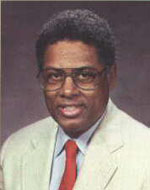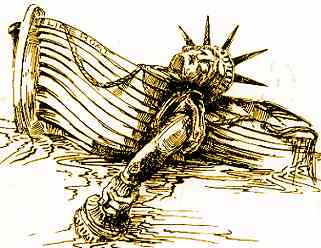|
|
Jewish World Review Oct. 9, 1998 / 19 Tishrei, 5759
Thomas Sowell
VERDICTS IN CIVIL LAWSUITS are supposed to be determined by "a preponderance of the evidence." Criminals are to be convicted when their guilt is proved "beyond a reasonable doubt." But what are the standards for impeachment?
Cynics may say that it is whatever a majority of those voting choose to use as their standard. But this is too clever by half. At best, it describes instead of analyzing.
Using that kind of reasoning, you could say that a verdict in either a civil or a criminal case is whatever a jury chooses to do. But surely no one wants our courts to use that as a standard, which could make miscarriages of justice the norm and appeals to higher courts futile.
Since we no longer believe in the divine right of kings, holding office is not a right but a trust. Removal from office is therefore not so much a punishment for an individual as a means of safeguarding the larger society from violations of trust by those who hold power -- now and in the future.
Unlike the criminal who is put behind bars, the person who is impeached and then convicted walks away as free as a bird and retains all the rights that everyone else in the society has. In a criminal case, we are talking about the enormous power of the state arrayed against one individual. In impeachment, we are talking about someone who already wields power over the rest of us.
It is right that we go to great lengths to make sure that an individual is subject to punishment only after his guilt has been proven beyond a reasonable doubt. But we do not require any such stringent standard in a dispute between two sides in a civil lawsuit. There we are content to let the case be decided in favor of whichever side has the preponderance of evidence.
Some years ago, federal judge Alcee L. Hastings was impeached and removed from the bench by the United States Senate because of corruption charges -- on which he had been acquitted in a court of law. After listening to many hours of the impeachment hearings, I concluded that both the Senate and the jury were right to reach the verdicts they did, even though these verdicts seemed to contradict each other.
The preponderance of the evidence suggested that Judge Hastings was corrupt -- but it was not proved beyond any reasonable doubt.
After being removed from the bench, Judge Hastings suffered no punishment or loss of his rights. In fact, he exercised his right to run for Congress, where he is a member of the House of Representatives today.
If we are going to talk about impeachment seriously -- instead of in spin and sound bites -- then we need to talk about what it actually is. Impeachment simply says that there is enough adverse evidence about someone in power to put that person on trial to determine whether he or she should continue in that particular office.
The "presumption of innocence" is a necessary shield against the power of government in a criminal case. But no such arbitrary presumption applies in the other 99 percent of human life.
If anything, the presumption is that the rights of millions of ordinary citizens, and of the rule of law on which they and their descendants depend, outweigh any non-existent right of any particular person to hold any particular office. Whether you like or don't like the president, he is not the issue. The United States of America is the issue.
Nor does it matter whether you like or don't like Paula Jones. She is one of those ordinary citizens for whom courts of law exist. If she cannot get justice because of perjury, then you cannot get justice because of perjury, if we allow it to be winked at.
Impeachment is not a popularity contest. Nor is it a race to see how fast we can get something unpleasant over with. That used to be called "a rush to judgment" -- until very recently, when the spin masters changed their
 Impeachment standards
Impeachment standards

 When considering whether to remove someone from public office, the power imbalance is very different from that in a criminal case. In impeachment cases, it is the accused who has power and the rest of us who have to be defended against its misuse. It is not just its misuse against us personally that is involved. Power can be misused against the institutions and functions of government, on which the rule of law depends -- and therefore against the freedom and justice to which millions of ordinary citizens are entitled.
When considering whether to remove someone from public office, the power imbalance is very different from that in a criminal case. In impeachment cases, it is the accused who has power and the rest of us who have to be defended against its misuse. It is not just its misuse against us personally that is involved. Power can be misused against the institutions and functions of government, on which the rule of law depends -- and therefore against the freedom and justice to which millions of ordinary citizens are entitled.

10/08/98: Alternatives to seriousness
10/07/98: Heredity, environment and talk
10/02/98: A much-needed guide
10/01/98: Starr's real crime
9/24/98: Costs and power
9/18/98: Are we sheep?
9/16/98: Judicial review
9/15/98: Hillary Rodham Crook?
9/14/98: Taking stock
9/11/98: Moment of truth
9/04/98: Random thoughts
8/31/98: The twilight of special prosecutors?
8/26/98: "Doing a good job"
8/24/98: America on trial?
8/19/98: Played for fools
8/17/98: A childish letter
8/11/98: Hiding behind a woman
8/07/98: A flying walrus in Washington?
8/03/98: "Affordability" strikes again
7/31/98: Random thoughts
7/27/98: Faith and mountains
7/24/98: Clinton in Wonderland
7/20/98: Where is black 'leadership' leading?
7/16/98: Do 'minorities' really have it that bad?
7/14/98: Race dialogue: same old stuff
7/10/98: Honest history
7/09/98: Dumb is dangerous
7/02/98: Gun-safety starts with
parental responsibility
6/30/98: When more is less
6/29/98: Are educators above the law?
6/26/98: Random Thoughts
6/24/98: An angry letter
6/22/98: Sixties sentimentalism
6/19/98:Dumbing down anti-trust
6/15/98: A changing of the guard?
6/11/98: Presidential privileges
6/8/98: Fast computers and slow antitrust
6/3/98: Can stalling backfire?
5/29/98: The insulation of the Left
5/25/98: Missing the point in the media
5/22/98: The lessons of Indonesia
5/20/98: Smart but silent
5/18/98: Israel, Clinton and character
5/14/98: Monica Lewinsky's choices
5/11/98: Random thoughts
5/7/98: Media obstruction of justice
5/4/98: Dangerous "safety"
5/1/98:
Abolish Adolescence!
4/30/98: The naked truth
4/22/98: Playing fair and square
4/19/98: Bad teachers"
4/15/98: "Clinton in Africa
"
4/13/98: "Bundling and unbundling
"
4/9/98: "Rising or falling Starr
"
4/6/98: "Was Clinton ‘vindicated'?
"
3/26/98: "Diasters -- natural and political"
3/24/98: "A pattern of behavior"
3/22/98: Innocent explanations
3/19/98: Kathleen Willey and Anita Hill
3/17/98: Search and destroy
3/12/98: Media Circus versus Justice
3/6/98: Vindication
3/3/98: Cheap Shot Time
2/26/98: The Wrong Filter
2/24/98: Trial by Media
2/20/98: Dancing Around the Realities
2/19/98: A "Do Something" War?
2/12/98: Julian Simon, combatant in a 200-year war
2/6/98: A rush to rhetoric